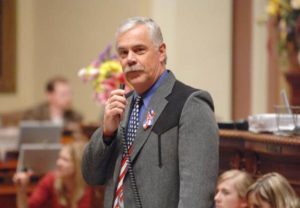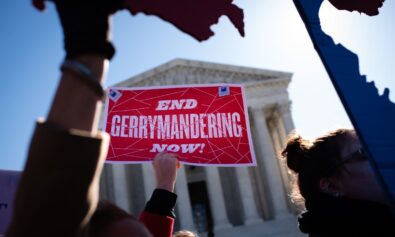
tonycornish.com
A letter to the editor sent by Minnesota State Rep. Tony Cornish has unleashed controversy among readers, including the local NAACP. In it, the official warns those who get questioned by police not to “be a thug” or “hang out on the street after 2 a.m.” His coded language has sparked outrage on social media, as users deem the list racist – especially since it was published days after it was announced police won’t be prosecuted for Jamar Clarks’s death.
Cornish sent the following to the Star Tribune, which published it online June 7:
“Lately, some advocacy groups have been asking what we can do to “reduce the use of force by police.” Well …
1) Don’t be a thug and lead a life of crime so that you come into frequent contact with police.
2) Don’t rob people, don’t use or sell drugs, and don’t beat up your significant other.
3) Don’t hang out on the street after 2 a.m. Go home.
4) Don’t make furtive movements or keep your hands in your pockets if told to take them out.
5) Don’t flap your jaws when the police arrive. Don’t disobey the requests of the police at the time. If you think you are wrongfully treated, make the complaint later.
6) Don’t use the excuse of a lack of a job or education for why you assault, rob or kill.
I was born and raised on a farm, dirt-poor, with eight other kids. My grandpa served time in Stillwater State Prison. My dad only made it through eighth grade, and none of us nine kids has ever received a college degree. We didn’t use that as an excuse to turn to crime.
Here endeth the lesson. No charge.”
Cornish is chair of the Minnesota House Public Safety and Crime Prevention Committee.
Fox 9 spoke to the representative, who brushed off criticism by saying those who accuse him of racism are diminishing his message.
“By people calling me racist, they’re trying to minimize my message,” he told the news station. “They know my message is true. And it would help in almost all cases if those rules were followed.”
Minneapolis NAACP president Nekima Levy-Pounds disagrees.
“I do believe that what representative Cornish had to say was racist,” she told reporters. “I believe that he knew that it was racist when he wrote it. He is focusing specifically on young African-American men with some of the language that he uses like ‘thug.’ We know that is a coded reference to young African-Americans.”
Cornish claims in his 32-year cop career he was “not aware” of thug being used for “Black or people of color,” adding police use thug all the time. He explained he wrote the letter because he “just got sick of cops being used as a scapegoat when something goes wrong.”
But Levy-Pounds told WCCO, “He’s drawing upon racial stereotypes that people often use to justify the use of excessive force against African-Americans, even when African-Americans — who are unarmed — are killed by law enforcement.”
The ex-police officer denied being racist and proceeded to list reasons why that was not the case.
“I’ve got relatives that are Black,” he said in a phone call to Fox 9. “I’ve gone to five different mission trips in the jungle. I spent big money helping women adopt Black kids from Africa. I don’t fit the racist mold. So they should give that a rest.”
He also told the local CBS affiliate groups like the NAACP that protest police show “irrational behavior” and puts blame on perpetrators of any race.
“Quit using excuses,” he said. “You did it because you wanted to do it.”
On Twitter, the reaction has been stark.
I was going to say that Tony Cornish's strib write-up was too gd racist for a newspaper, but Opinion Section, We'll Print Whatever™
— ⚡️ Taylor ⚡️ (@_taylor_) June 8, 2016
Tony Cornish grew up on a farm selling cash crops, and was a police officer. Of course he has a bias.
— Mom Purse Maurice (@MightyMan73101) June 9, 2016
This the white people that hate minorities starter pack ( Fuck Tony Cornish) https://t.co/r2HFm2p22F
— ✵ ØG 24Kt'D ✵ (@IAN_XXIVKTD) June 9, 2016
#1 "don't be a thug"
Says the man who portrays himself to be the white version
Of a thug. (Oops I meant cowboy) pic.twitter.com/pIclAIQV8w— Finding Novyon (@FindingNovyon) June 9, 2016
David Banks, assistant editor of the Star Tribune, told Think Progress the goal of publishing Cornish’s piece was to “facilitate a full debate.”
He says in part, “whatever one may think of the Cornish letter, it reflects a point [of] view that is shared by a proportion of the people who write to us. Cornish’s leadership role is a factor, too — one I believe is especially pertinent for those who may disagree with his stance. Whether one is trying to develop a point of view or defend an existing one, isn’t it better to be aware of all of the sentiments that may influence public policy?”


